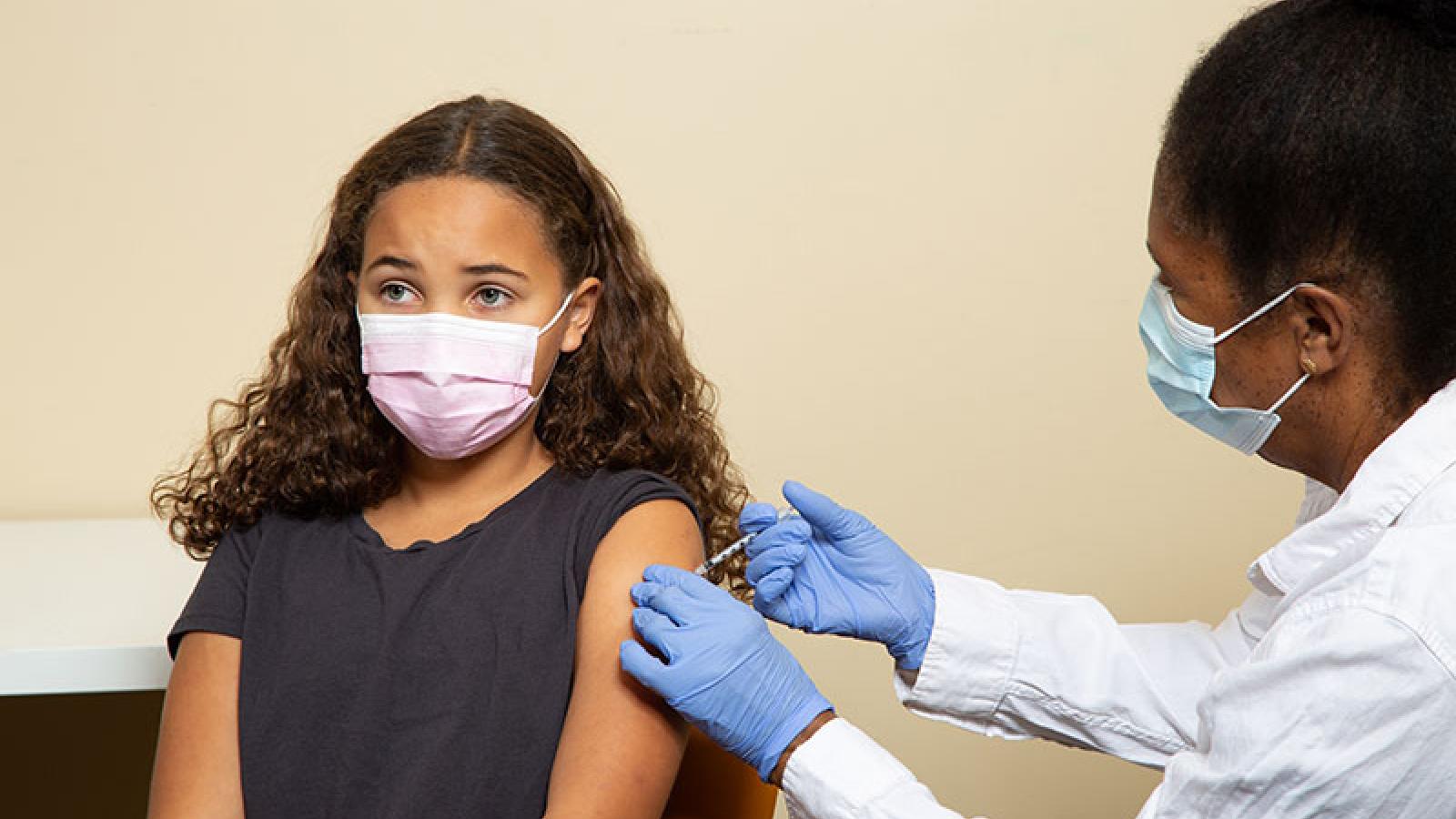Kids and COVID-19 Vaccines: What Parents Need to Know

Now that adolescents and teens can get vaccines, you may have questions if they should.
At this time, children as young as age 12 have been approved to receive a COVID-19 vaccine (Pfizer only). That leaves many parents wondering whether they should have their kids vaccinated or not.
In one survey conducted by the Kaiser Family Foundation in April 2021, before the Pfizer vaccine was approved for children ages 12-15, 30% of parents said they would get their 12-15 year old child vaccinated right away, 26% said they would wait to see how it's working, 18% said they would do it only if required by schools and 23% said they definitely would not vaccinate their kids.
The reality is that some parents can't decide if vaccinating kids against COVID-19 is the right thing to do. They're worried about vaccine safety and side effects. And they may be confused by misinformation circulating on the subject.
Here are answers to some of the most commonly asked questions from parents.
Why was the COVID-19 vaccine not originally approved for kids?
When vaccines were initially in development, the primary focus was on creating a vaccine that was safe and effective for adults, who were more at risk for serious complications from COVID-19.
When children get COVID-19, their symptoms are usually mild, if they have symptoms at all, so they were not initially prioritized in vaccine trials, approvals or rollout. But that didn't mean vaccine manufacturers weren't thinking about making sure vaccines were safe for kids. They just wanted time to conduct trials specifically on different age groups to ensure that what they deemed safe for adults was also safe for younger and smaller bodies.
So if kids aren't at high risk for serious illness from COVID-19, why do they need vaccines?
Even though kids usually have milder symptoms than adults, getting them vaccinated will help prevent them from getting typical COVID symptoms (similar to the flu) or developing serious but rare complications from the virus. Vaccinating kids also helps protect family members, teachers and other people they come in contact with, since kids can transmit the virus even if they have mild or no symptoms. Additionally, achieving herd immunity – which is needed to lessen the threat of COVID-19 for our country and the world – requires vaccination of a high percentage of the population and that means vaccinating kids as well as adults.
Is the COVID-19 vaccine safe for kids?
In early May 2021, the Food and Drug Administration (FDA) declared that the Pfizer vaccine is safe for adolescents (age 12 and older) and teens. It was previously approved for people age 16 and older. Pfizer's clinical trial included more than 2,000 volunteers, ages 12 to 15. There were no cases of COVID-19 in any of the fully vaccinated participants. The FDA does not give out approval lightly – they only do so after reviewing evidence showing that the benefits of vaccination far outweigh any risks.
Why is Pfizer the only COVID-19 vaccine approved for kids?
Every pharmaceutical company that makes COVID-19 vaccines has been conducting its own clinical trials. Pfizer was simply the first one to get approval from the FDA to administer their vaccine to people under 18. The others are also conducting clinical trials on people of varying ages and may be seeking approval for younger age groups if and when they can show it's safe.
Do kids experience the same vaccine side effects as adults?
Studies show that when kids have post-vaccine side effects, they're typically the same mild symptoms as those reported in adults. Common symptoms include a sore arm, fatigue, muscle aches and fever, usually occurring 24-48 hours after the shot.
Will my child be required to have vaccine proof to go back to in-person school?
The federal government has left it up to states to determine whether vaccine proof will be required for access to public places, including schools. Hundreds of colleges and universities have announced vaccine requirements for students beginning in fall 2021. Most public school districts are still working on their policies. Your child's school or daycare facility will let you know whether a COVID-19 vaccine will be needed for enrollment and what type of proof will be required, if any.
My child is due for other vaccines, too. Can we get them all at once?
The CDC recommends that people of all ages wait at least 14 days after other vaccines to get a COVID-19 vaccine – and that no other vaccines be given in the 14 days after receiving a COVID-19 vaccine. This includes any vaccines or booster shots kids may need, as well as annual flu shots.
Copyright 2021-2023 © Baldwin Publishing, Inc. Health eCooks™ is a designated trademark of Baldwin Publishing, Inc. Cook eKitchen™ is a designated trademark of Baldwin Publishing, Inc. Any duplication or distribution of the information contained herein without the express approval of Baldwin Publishing, Inc. is strictly prohibited.
Date Last Reviewed: May 18, 2021
Editorial Review: Andrea Cohen, Editorial Director, Baldwin Publishing, Inc. Contact Editor
Medical Review: Perry Pitkow, MD
Learn more about Baldwin Publishing Inc. editorial policy, privacy policy, ADA compliance and sponsorship policy.
No information provided by Baldwin Publishing, Inc. in any article is a substitute for medical advice or treatment for any medical condition. Baldwin Publishing, Inc. strongly suggests that you use this information in consultation with your doctor or other health professional. Use or viewing of any Baldwin Publishing, Inc. article signifies your understanding and agreement to the disclaimer and acceptance of these terms of use.

